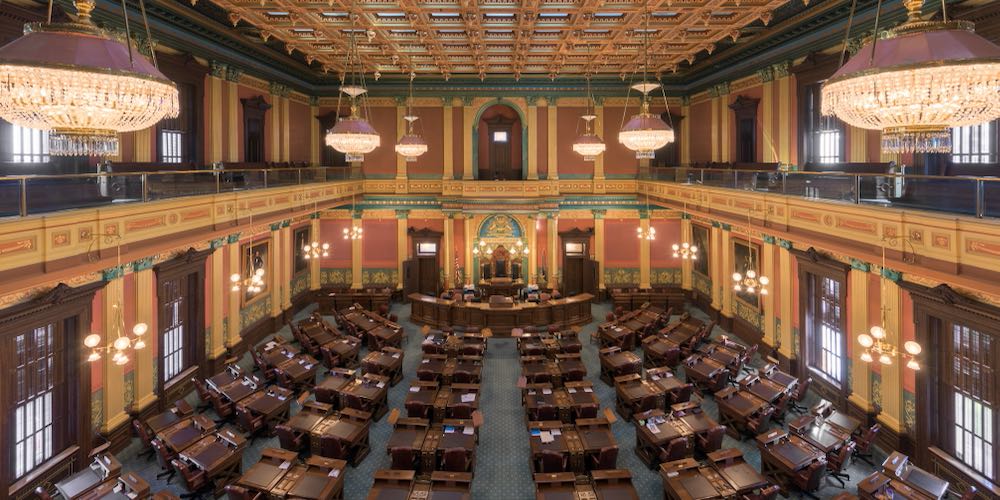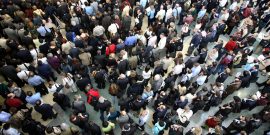Conservatism should help us negotiate the tragic tradeoffs of life: a way between market and political liberalism versus solidarity. Tocqueville can help.
The Dream of Scalable Democracy
They—I’m looking at you, Tip O’Neill—say all politics is local. “They” are wrong. But they should be right.
If all politics were really local, voter turnout would be highest in local elections. But the opposite is the case. The majority of Americans don’t vote in midterm elections, but a majority do vote when the presidency is on the line.
If all politics were local, then people would have greater incentive—or at least find it easier—to cast an informed vote. One would only need knowledge of oneself and one’s own community, because that would be exactly what each election would be about.
Following on that, if all politics were truly local, there would be less power in partisanship. If what motivates my vote is a concern for fixing potholes on the US-131, or improving Grand Rapids, Michigan’s elementary and secondary schools, or protecting the sacred rights of Greek Orthodox churches in my city to hold high-revenue ethnic festivals on their property, I wouldn’t care much about the party of the candidate who had a workable plan for doing those things.
Now, someone could point out that one can already vote for people who affect local change. We already have local elections, don’t we? Of course, we do. But unfortunately, as noted above, Americans generally don’t vote in those elections. We could add to this, per the foregoing, that several states allow for straight-ticket voting, meaning that votes “cast” for lower-level offices often just reflect a voter’s party preference for the presidency or other higher office, pushing national and even state-level concerns downward rather than local concerns upward. The decline of local news in favor of partisan national news media can’t possibly help such trends either, even where straight-party voting isn’t an option.
This list of grievances against our current electoral system and voter habits is far from comprehensive, but it should be sufficient to make my point: American politics is not really local. But it should be.
What follows is self-consciously utopian, in both senses of that word: that is, I think that there is no place (ou-topos) in which this idea would ever be viable and put into practice, but that if there were, it would be a good place (eu-topos).
Eu-topia
Political philosophers from Thomas Hobbes to John Locke to John Rawls have used utopian thought experiments in order to illustrate the principles they believed most essential and natural to just societies. Thank God, no one has ever constructed Hobbes’s Leviathan, for example, but through interacting with it, often critically, many have been inspired to forge new ways in the real world for the advancement of liberty.
My electoral utopia, to the extent it would be a eu-topia, looks like this: All politics would be truly local, i.e., structurally and constitutionally so. Naturally, the first thing to go would be the Seventeenth Amendment to the US Constitution, which established the direct election of senators by voters instead of their indirect election by state legislatures. Now, I’m not the first crank to bemoan this Progressive-Era blight upon our body politic, but I wouldn’t stop there. I’m just getting started. I also would eliminate the direct election of all national offices, including the President of the United States, and some state-level offices, even governors.
What I envision is a fully tiered electoral system. The only direct elections would be the most local.
Why? The core problem with our electoral system today is scalability. One vote in a thousand means something. Candidates with that small of a voting pool need every single vote they can get. The local homecoming queen is more representative of her constituents than members of Congress. One in a million, however—so my economist friends tell me—does not matter on the margin.
As the Antifederalist Samuel Bryan warned in Centinel I:
Do we not already see, that the inhabitants in a number of larger states, who are remote from the seat of government, are loudly complaining of the inconveniencies and disadvantages they are subjected to on this account, and that, to enjoy the comforts of local government, they are separating into smaller divisions[?]
Moreover, Bryan worried that congressional districts of 30,000 would be far too large:
The number of the representatives (being only one for every 30,000 inhabitants) appears to be too few, either to communicate the requisite information, of the wants, local circumstances and sentiments of so extensive an empire, or to prevent corruption and undue influence, in the exercise of such great powers….
Due to various efforts and finally the Reapportionment Act of 1929, today our district size would be alarmingly unconstitutional on a literalist reading of Art. 1, Sec. 2. The largest such district is (at least until January 3) Montana’s fittingly-named “at-large congressional district,” comprising over a million people. One concern of capping members of the House of Representatives at 435 is that Congress might run out of literal seats (as if they couldn’t legislate just as well—or poorly—from FedEx Field). Actually, this to me is the best objection, since it is so deeply practical. Indeed, it does seem that 30,000—far from being too large, as Bryan worried—may be too small, at least if physical chairs in our actual Congress matter.
But physical chairs do not matter for utopias. And anyway, I do not think it would be a problem. What I would envision is a fully tiered electoral system. The only direct elections would be the most local. Those elected officials would get to vote on the next level up, and so on, all the way up to the office of president.
To support this, I’d further appeal to John Adams’ Thoughts on Government, written in April 1776 for the North Carolina Provincial Congress:
Let the Representative Assembly then elect by ballot, from among themselves or their constituents, or both, a distinct Assembly, which for the sake of perspicuity we will call a Council. It may consist of any number you please, say twenty or thirty, and should have a free and independent exercise of its judgment, and consequently a negative voice in the legislature.
Thus, the Assembly of elected officials would elect a second body, the “Council.” He continues, “These two bodies thus constituted, and made integral parts of the legislature, let them unite, and by joint ballot choose a Governor….” Not the people, but their representatives (and the higher body chosen by those representatives) would elect the governor of North Carolina in Adams’ framework. This, he believed would reduce corruption and help avoid the dangers of concentrating too much power in one single branch of government.
Prime ministers in many parliamentary systems are elected not by individual voters but the governing coalition, so there is a world in which something like that aspect of this idea could really work. Ah, but really working is exactly what my idea, unfortunately, would not do.
Ou-topia
The reason this would never work is not a matter of constitutional mechanics. On that score I think it would work splendidly, resulting in less partisanship, more voter buy-in, more-informed voters, and maybe even heightened voter turn-out. I would even go so far as to say that I think my proposal would be more democratic than our current system, but making that case rhetorically is precisely where it wouldn’t work.
Every four years since 2000, the same cry issues loudly across the November editorial pages: the cry to abolish the Electoral College. Americans don’t like it. They want more direct democracy. My point is that the more direct the democracy, the weaker—and thus, less democratic—it is.
If I don’t like the current president, I can vote for another. Michigan has 16 electoral votes and a population of roughly 10 million people. My vote would have to be the marginal vote out of about 625,000 people to be the deciding vote for a single Michigan delegate—and I don’t even get to vote for the delegate, just the president! Compare that to the power I have over Michelle McCloud, Kent County District 13 county commissioner, where my vote is just a little less than one in 30,000—just as the Framers intended!
But try convincing your fellow American that we’d be better off with an electoral college of county commissioners instead of voting for president or US senator or governor ourselves. Imagine how easily such a pro-democratic position could be tarred as “undemocratic,” simply because it isn’t direct democracy. For some, the objection may be motivated by a simple sense that they want a say in national politics. After all, national politics is almost all about which our media prepares anyone to form an opinion. Others might cite loftier principles, such as a Rousseauan “general will” of the people. Whatever the reason, for a lot of people all they’d hear is “I don’t think you should get to vote on that office or issue.” Put that way, a rhetorical mountain stands in the way, and truly scalable democracy in America remains a utopian dream.
But perhaps simply by dreaming, it—or something inspired by it—may one day be reality. It wouldn’t be the first time, at least.



